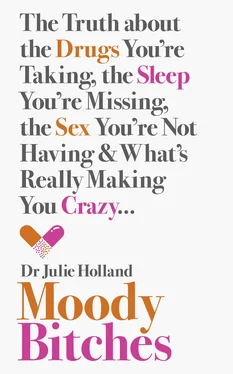My patients on SSRIs will report, “I knew the situation was upsetting. I was supposed to be feeling sad, but I couldn’t cry.” Crying isn’t just about sadness. When we are frustrated, when we are angry, when we see injustice, when we are deeply touched by the poignancy of humanity, we cry. And some women cry more easily than others. It’s normal. It’s how we’re designed, and it doesn’t mean we’re weak or out of control.
Crying allows us to deeply feel what we’re feeling and then move on. It is a crescendo that naturally leads to a denouement of intensity. For most women, this depth of feeling is a birthright, but if you really can’t stand crying, or get frustrated because you can’t speak when your throat tightens, here are two tricks that work well instead of meds. Simply think up lists of rhyming words, or subtract sevens from one hundred. Shunting blood away from the emotional centers and over to the rational verbal or calculating areas will mollify most people. (You just have to remember to do it, which means relying on your hippocampus to tamp down your amygdala.)
There are times when it’s inconvenient, to say the least, to cry, but there are other times when it’s to your advantage. Letting yourself cry can be important in communicating with your partner. A clear, visible sign that we’re upset may be just what men need. Women pick up subtle signs of sadness in others 90 percent of the time. Men are better able to discern anger and aggression; when trying to decide whether their female partner is sad, men are right only 40 percent of the time. That’s less than if they flipped a coin to help them answer. This is also a reason to express your feelings verbally and not expect your male partner to know how you’re feeling by how you look or act. They’re simply not constructed for intuiting emotion the way we are. As for families, sometimes it’s a good idea to let your kids see you cry, especially if they’ve scared you with reckless behavior or frustrated you with thoughtlessness. Tears can underscore lessons in how their behavior affects others.
But we clearly have issues around our tears. Have you ever noticed how often women apologize for crying? In part it’s because men are uncomfortable with expressed emotion, and so they, and we, have been socialized to shut it down. Another part is that emotion interferes with the forward-momentum agenda so prevalent in our society. The problem with shutting it down is that we’re stifling a piece that we need, that our partners and families need, and that the world needs.
Being sad can help us make clear-eyed assessments of our lives. Depressed people are no longer in denial about unpleasant or hurtful truths. SSRIs can create complacency in times when action is needed, perhaps to leave an abusive spouse or a dead-end job. Medication can make a bad situation tolerable and mask the need for change. In one study of medicated women, “these patients continued to lead dysfunctional lives, and their motivation for major lifestyle changes seemed to decrease as depressive symptoms improved.” In such situations, the symptoms of depression, unpleasant though they may be, can be the clarion call to action.
Another issue to consider: stuffing down your feelings is going to make you miserable. The suppression of anger in particular is a crucial factor in depression. People who’ve experienced depression are more likely to hold in their anger and fear expressing it, believing they must hide their feelings to preserve their relationships. Depressed patients have higher levels of anger than control subjects; the more anger, the more severe the depression.
In my office, I see evidence of this link frequently. Many of my female patients have no idea how to express their anger in healthy ways, and their suppressed anger contributes to their depression and, I believe, other medical symptoms as well. They weren’t taught as young girls that it was okay to be angry, and they weren’t schooled in how to handle this kind of emotion. Sugar and spice don’t make space for anything that’s not nice. When we don’t even know we’re angry, we can’t converse with the person responsible or otherwise tackle the problem. We cry; we eat; we soothe ourselves a thousand different ways. Instead, we need to fully feel our feelings of anger, figure out where they are coming from, pull ourselves together, and then head out the door for a face-to-face conversation. I had a patient who called me from her office in tears, saying she needed to go up on her SSRI because she couldn’t be seen crying at work. After dissecting why she was upset (her boss had humiliated and betrayed her in front of her staff), we decided that what was needed was calm confrontation, not more medication.
In an examination of women’s employment reviews, certain words show up repeatedly, like bossy, abrasive, strident , and aggressive . This is when they lead; words like emotional and irrational are used when they object. Men are exhorted to be more aggressive in the workplace, but not so with women. What’s interesting is that SSRIs reduce aggression, poor impulse control, and irritability while increasing cooperation and affiliative behaviors. Primate research shows that SSRIs augment social dominance behaviors, elevating an animal’s status in the hierarchy. So they may well help women get along, and even get ahead, in the workplace, but at what cost?
I notice in my female patients a certain self-consciousness about being assertive. “I think, maybe” is the way a woman begins her sentence even when she knows damn well that she’s right. We hem and haw to seem as if we’re unsure, even though we should trust our gut and speak firmly and bravely. Growing up, I was taught, directly and indirectly, how to couch my ideas so they’d be taken as suggestions or opinions and not as statements of facts. I will not teach my daughter to tone down her self-confidence when she speaks. Little girls need every ounce of self-esteem they can get. It’s much easier to soften the edges later in life than it is to build up a foundation of self-worth. And girls who hold on to their assertiveness and self-esteem are less likely to grow up to be depressed women.
The H Word
In the nineteenth century, hysteria was a uniquely female diagnosis that became a catchall for many women’s complaints that couldn’t be immediately remedied. Nearly all physicians were men in the 1800s, and they lumped a number of physical and emotional symptoms reported by women under one heading, derived from the Greek word for uterus, hystera . Criteria for hysteria included malaise, headaches, irritability, nervousness, insomnia, fatigue, low libido, high libido, water retention, and, eventually, any behavior undesirable to society, such as organizing the right for women to vote. One treatment for hysteria involved bringing the patient to orgasm, while another, clitoridectomy, involved surgical removal of the clitoris, and was performed throughout the 1880s and into the 1920s.
These days, hysteria has a more specific meaning: excessive expression of emotion, especially vulnerabilities such as despair or panic. If a woman behaves in a way that a man finds uncontrollable or inconvenient, she will be accused of being hysterical, basically being told she doesn’t have a right to feel or act that way because it isn’t in line with how a man would feel or act. Keep in mind, many a boy grows up at the mercy of his mother’s emotions, and so men fear the emotionality of women. This may be one reason that some male doctors are quick to squelch any expression of emotion in their female patients, most easily by reaching for a prescription pad.
While the term hysteria is no longer officially used in medicine, there is the increasingly common diagnosis of the “women’s disease” fibromyalgia. Symptoms include mysterious muscle aches, joint pain, and exhaustion. Coincidentally, the current treatment for fibromyalgia is antidepressants. Epidemiological studies show a female-to-male preponderance of three-to-one for chronic pain diagnoses like fibromyalgia. Men are less apt to receive a diagnosis of fibromyalgia than women, even if they have the same symptoms.
Читать дальше












